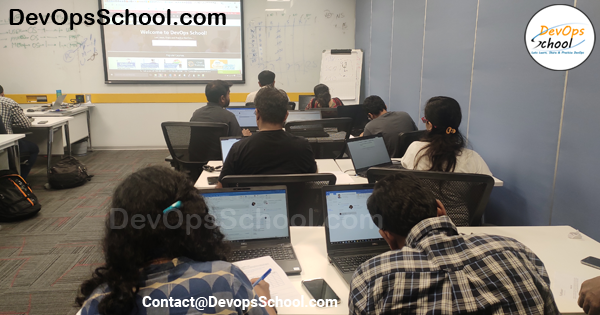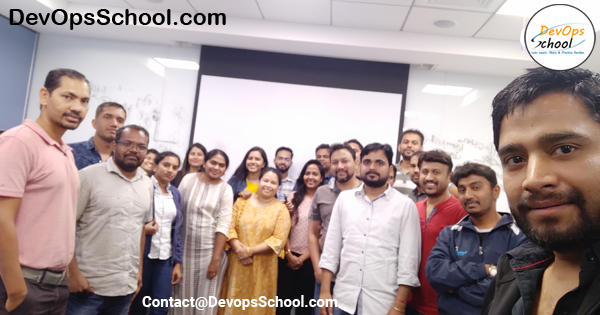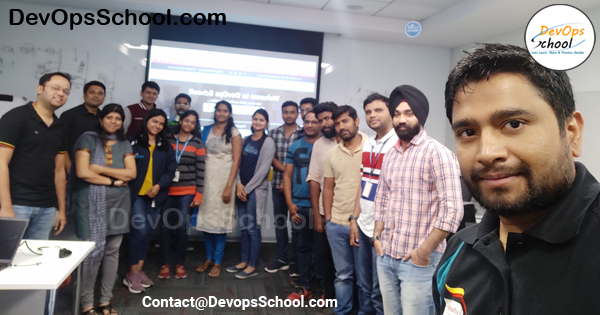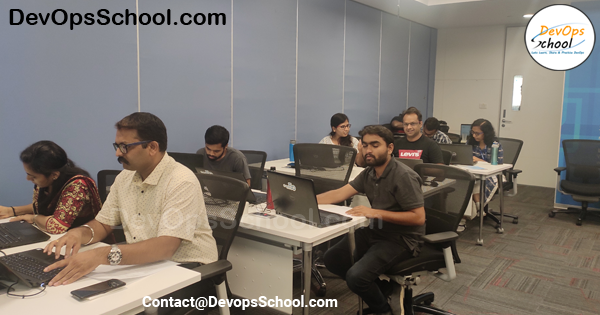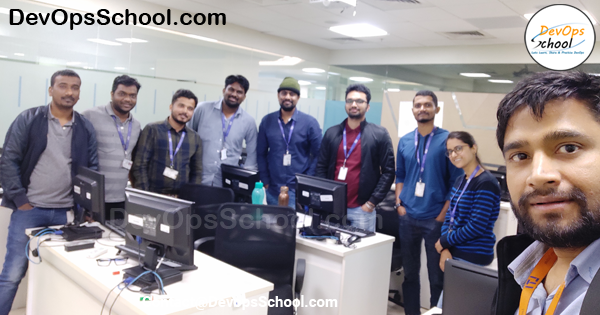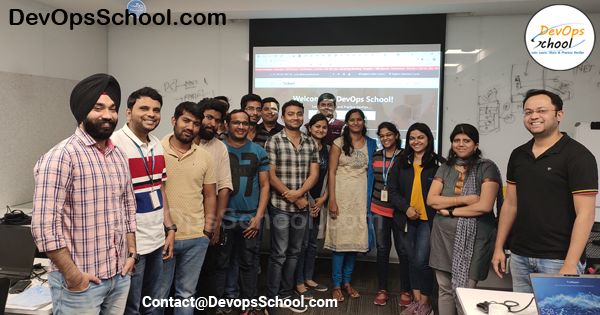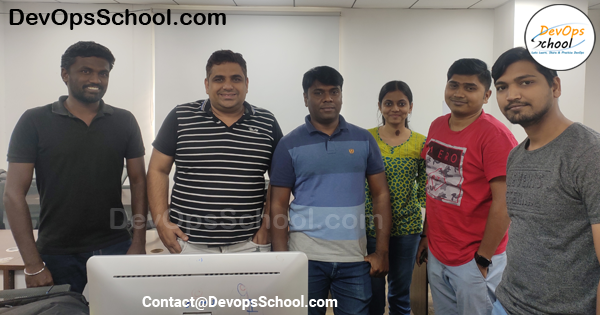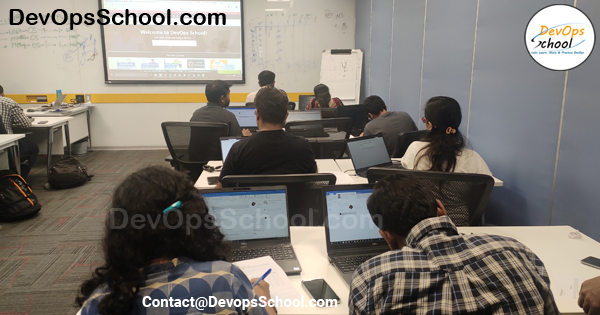About This Course and Certification
The Prometheus Training Course offered by Aiuniverse in collaboration with DevOpsSchool.com is a comprehensive program designed to equip participants with the skills required to deploy, configure, and manage Prometheus, an open-source monitoring system. Prometheus is widely used in DevOps, cloud-native environments, and Kubernetes ecosystems for monitoring, alerting, and gathering metrics.
This course is tailored for both beginners and advanced professionals, with a focus on practical, hands-on learning led by Rajesh Kumar, a seasoned DevOps expert with more than 15 years of experience in the field. The course includes extensive hands-on labs and projects, preparing students for real-world challenges and ensuring that participants are ready to implement Prometheus in production environments. Upon completion, participants will be ready to pursue relevant certifications and enhance their careers in monitoring and observability.
What is Prometheus?
Prometheus is an open-source systems monitoring and alerting toolkit originally developed at SoundCloud. It has since grown into a widely-adopted tool for monitoring Kubernetes clusters, infrastructure, and applications. Prometheus is particularly valued for its simplicity, powerful query language (PromQL), and ability to scale in cloud-native environments.
Key components of Prometheus covered in this course include:
- Prometheus Server: The core monitoring component responsible for collecting and storing metrics.
- PromQL (Prometheus Query Language): A flexible query language for extracting real-time monitoring data and creating custom alerts.
- Exporters: Tools to expose system or application metrics to Prometheus.
- Alertmanager: A service that handles alerts generated by Prometheus and sends notifications through channels like email, Slack, or PagerDuty.
- Grafana Integration: A popular tool for visualizing Prometheus metrics through dashboards.
Prometheus is designed for high scalability, making it ideal for monitoring cloud-native microservices architectures deployed on platforms like Kubernetes.
Why Prometheus is Important?
Prometheus has become the go-to monitoring tool for modern DevOps and cloud-native environments. Its importance is derived from several key factors:
- Kubernetes Native: Prometheus is deeply integrated with Kubernetes, allowing seamless monitoring of containers, services, and clusters.
- Time-Series Data: Prometheus specializes in time-series data collection, making it an essential tool for analyzing the performance of distributed systems over time.
- Efficient Metrics Collection: It collects metrics from different sources using exporters, which make monitoring both infrastructure and application-level metrics easy.
- Alerting Capabilities: With Alertmanager, Prometheus provides real-time alerting based on custom thresholds and conditions.
- Scalability: Prometheus can handle millions of metrics per second, which is essential for monitoring large and dynamic cloud environments.
- Community Support and Ecosystem: Prometheus has a large and active community, making it easy to find exporters, tools, and support for almost any use case.
For organizations adopting DevOps practices, cloud-native applications, or containerized environments like Kubernetes, Prometheus is critical for ensuring infrastructure stability and identifying performance bottlenecks.
Course Features
- Industry Expert Trainer: The course is led by Rajesh Kumar, a seasoned DevOps consultant and Kubernetes expert with extensive experience in Prometheus monitoring.
- Hands-On Focus: This training program emphasizes hands-on labs to ensure participants gain real-world skills in deploying and managing Prometheus.
- Certification-Oriented: Participants will be fully prepared to take certifications related to Prometheus and monitoring tools.
- Lifetime Access: Participants get lifetime access to all course materials, including videos, slides, and lab exercises.
- Real-World Use Cases: Learn from real-world examples and case studies on monitoring applications and infrastructure using Prometheus.
- Interactive Sessions: The course includes live sessions with Q&A, allowing participants to interact with the trainer and clarify doubts in real-time.
- Mock Exams: Practice tests to assess readiness for certifications.
Training Objectives
By the end of the course, participants will be able to:
- Understand Prometheus Architecture: Learn about Prometheus’s components, including Prometheus Server, Exporters, and Alertmanager.
- Install and Configure Prometheus: Set up Prometheus for collecting and storing metrics from applications and infrastructure.
- Monitor Kubernetes with Prometheus: Implement Prometheus to monitor Kubernetes clusters, Pods, and services.
- Use PromQL for Metrics Analysis: Gain proficiency in querying metrics using Prometheus Query Language (PromQL).
- Set Up Alerts with Alertmanager: Create custom alerts based on real-time metrics and route alerts to different channels.
- Integrate Prometheus with Grafana: Build powerful dashboards for visualizing metrics in Grafana.
- Scaling Prometheus: Learn to scale Prometheus for large environments and high availability.
- Understand Prometheus Exporters: Learn how to use and configure popular exporters for monitoring system metrics, databases, and other services.
Target Audience
This course is designed for:
- DevOps Engineers: Who want to integrate Prometheus into their DevOps pipelines for continuous monitoring and alerting.
- System Administrators: Looking to gain expertise in infrastructure monitoring and alerting systems.
- Cloud Engineers: Who manage Kubernetes and cloud-based infrastructure and need efficient monitoring solutions.
- Developers: Interested in understanding how their applications perform in production through metric-based monitoring.
- Site Reliability Engineers (SREs): Responsible for maintaining the reliability and uptime of production systems.
- IT Managers: Looking to implement monitoring solutions for large-scale, cloud-native, and distributed architectures.
Prerequisites: Basic knowledge of Linux, networking, and container technologies such as Docker and Kubernetes is recommended, but no prior experience with Prometheus is required.
Training Methodology
The training is designed to provide a blend of theoretical understanding and practical hands-on experience. The course structure includes:
- Live Instructor-Led Sessions: Real-time interactive classes with theory-based explanations and Q&A sessions.
- Hands-On Labs: Focus on practical labs where participants set up Prometheus, configure exporters, and create dashboards.
- Workshops and Case Studies: Explore real-world use cases and deploy Prometheus in production environments.
- Quizzes and Assignments: Short quizzes after each module and assignments for deeper learning.
- Peer Learning: Participants can engage with their peers through group discussions and collaborative problem-solving during labs.
Training Materials
Participants will receive the following materials during the course:
- Lecture Slides and Presentations: Detailed presentations covering each module of the course.
- Lab Guides: Step-by-step instructions for setting up and managing Prometheus in various environments.
- Recorded Sessions: Lifetime access to the recordings of all live sessions for future reference.
- Cheat Sheets: Handy reference guides for PromQL queries, Prometheus setup, and exporter configurations.
- Mock Exams: Sample tests to prepare for certification exams and reinforce learning.
- Project Work: Real-world project assignments that simulate real-time monitoring, alerting, and scaling scenarios.
Evaluation
The success and understanding of the course participants will be evaluated through:
- Pre-Assessment Tests: To gauge the knowledge level of participants before starting the course.
- Post-Training Evaluation: Participants will undergo a final evaluation to measure knowledge retention and the ability to apply the learned concepts.
- Practical Lab Assessments: Evaluation of hands-on labs to ensure participants are able to implement Prometheus effectively.
- Mock Certification Exams: Simulated exams to prepare for any official Prometheus or monitoring-related certification.
- Feedback and Surveys: A post-training survey to gather participant feedback on the course content, teaching style, and areas for improvement.
Continuing Education
Once participants complete the course, they can continue their learning journey through:
- Prometheus Official Documentation: Access to the official Prometheus documentation for deep-dive learning.
- Advanced Monitoring Courses: Participants can take advanced courses on Grafana, Kubernetes Monitoring, and Alerting Strategies.
- Community Support: Join the Prometheus community, Slack channels, and forums for continuous learning and support.
- Webinars and Meetups: Invitations to exclusive webinars, meetups, and community events organized by Aiuniverse and DevOpsSchool.
Certifications Program
Upon completion of this training, participants will be ready to pursue certifications such as:
- Prometheus Certified Engineer: A certification focused on mastering Prometheus setup, configuration, and scaling.
- Certified Kubernetes Administrator (CKA): Participants with Kubernetes knowledge can pursue the CKA certification, with a focus on monitoring clusters using Prometheus.
- Certified DevOps Engineer: Certification programs that include Prometheus as part of the overall DevOps toolchain.
The certifications will validate participants’ expertise in monitoring cloud-native and distributed systems using Prometheus, enhancing their career opportunities in DevOps, SRE, and Cloud Operations.
Level of the Training
The training is designed to accommodate participants at all levels, from Fundamentals to Advanced. Beginners will learn the foundational concepts of Prometheus, while experienced professionals will dive deep into scaling, optimizing, and managing Prometheus in complex environments.
Agenda (Day-Wise)
Day 1:
- Introduction to Prometheus: What is Prometheus, its architecture, and use cases.
- Installing Prometheus: Setting up the Prometheus server and exporters.
- Understanding Time-Series Data and Metrics Collection.
Day 2:
- Configuring Prometheus for Monitoring: Configuring scrape targets, Prometheus jobs, and working with exporters.
- Introduction to PromQL: Querying time-series data, writing complex queries, and aggregating data.
- Monitoring Kubernetes Clusters with Prometheus.
Day 3:
- Alerting with Prometheus and Alertmanager: Configuring rules, alerts, and notifications.
- Grafana Integration: Building dashboards to visualize Prometheus metrics.
- Hands-on Labs: Creating custom dashboards and alerts for real-time systems.
Day 4:
- Scaling Prometheus: Managing large environments, federation, and high-availability.
- Securing Prometheus: Implementing authentication, authorization, and TLS encryption.
- Troubleshooting Common Issues: Identifying and fixing common problems in Prometheus setups.
Day 5:
- Advanced PromQL Techniques: Deep dive into PromQL for advanced data analysis.
- Final Project: End-to-end deployment of Prometheus in a production-like environment.
- Certification Preparation: Mock tests, final Q&A, and course wrap-up.
Lab Setup
To participate in the hands-on labs, participants should have the following environment:
- Linux VM or Cloud Instances (AWS, Azure, or GCP).
- Minimum configuration: 4 vCPUs, 8 GB RAM, and Docker installed (for containerized Prometheus setup).
- Prometheus, Alertmanager, and Grafana pre-installed (setup instructions provided).
- Basic networking setup for configuring exporters and monitoring services.
Detailed instructions for setting up the lab environment will be provided before the course.
Trainer: Rajesh Kumar
The course is led by Rajesh Kumar, a renowned expert in the DevOps and Cloud space with over 15 years of experience. Rajesh has extensive experience in deploying and managing Prometheus for large-scale cloud-native infrastructures and Kubernetes clusters. He has trained thousands of professionals in DevOps, monitoring, and observability, helping them achieve their career goals.
For more information about Rajesh Kumar, visit www.rajeshkumar.xyz.
FAQs
- What are the prerequisites for this course?
Basic knowledge of Linux, Docker, and Kubernetes is recommended, but no prior experience with Prometheus is necessary. - Will there be hands-on labs?
Yes, the course includes practical, real-world labs to ensure participants can apply Prometheus in production environments. - Is the course available online?
Yes, this course is available as a live online instructor-led training, and participants will also receive lifetime access to recorded sessions. - What certification will I receive?
Participants will receive a course completion certificate from Aiuniverse and be prepared for official Prometheus and related certifications. - Will I have access to course materials after completion?
Yes, participants will have lifetime access to the course materials, including recorded sessions, slides, and lab guides. - Is Prometheus suitable for small-scale monitoring?
Yes, Prometheus can be used to monitor small-scale setups, but it shines when used in large-scale, cloud-native environments. - How is Prometheus different from traditional monitoring tools?
Prometheus focuses on time-series data, offers powerful querying with PromQL, and is designed to work in dynamic cloud-native environments. - Can I integrate Prometheus with Grafana?
Yes, Prometheus integrates seamlessly with Grafana, allowing you to visualize metrics through customizable dashboards. - Will I receive support after the training?
Yes, participants can reach out for support after training through community forums, webinars, and ongoing learning resources. - What is the duration of the Prometheus certification exam?
The Prometheus certification exam duration varies depending on the certifying body but is typically 2-3 hours.
Certification
- Certification always plays vital role as it leads you towards a dedicated knowledge and skillsets.
- It provides you the ability to stand out of others.
- It gives you an edge during an interview by impressing the interviewer through your certification.
- DevOpsSchool helps you getting this certificate by making you worth to have it.
- DevOpsSchool gives you a completion certificate after successfully completion your training. it will be as a proof of your ability of knowledge and skills.
- The training will be given by industry recognized expert trainers who will make you an expert professional to hold this certificate.
- This certificate belongs to only DevOpsSchool, not to any other colleges, institute or company.
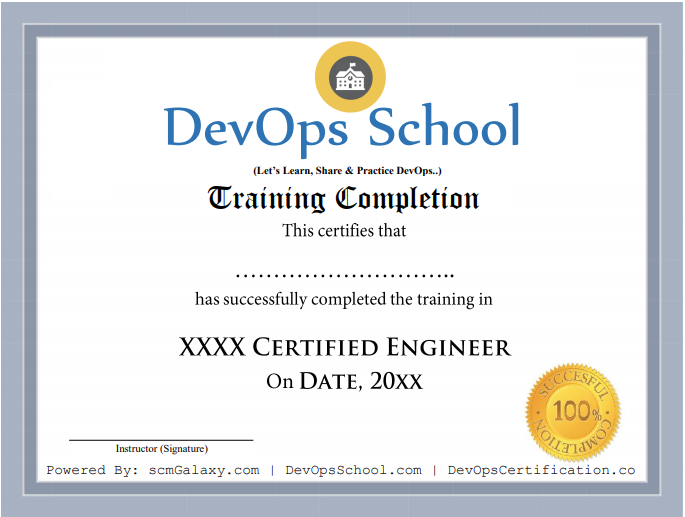
Reviews
By having an excellent journey with 8000+ participants from different countries we have got excellent reviews that helps us stand out of other institutes and being proud. We proudly can say we have helped so many individuals and working professionals to build their career. Here are some of the reviews that we have got from our participants who are happy by being a part of DevOpsSchool.
Videos
Projects
During this training you will get a real-time based project to work on, which will help you to implement your learnings and also it will boost your knowledge and skills. With important tools and platforms you will have real-world experience where we help you to visualize a real development environment, testing environment and production environments.
FAQs
1. Will I get technical support after completion of training?
- Yes, Its free of cost for life time. We will give you can access of our Google drive where you can drop you query and our trainers will respond you back.
2. Why should I learn Prometheus course online instead of offline?
- First this is the best option to keep you and your instructor safe in this dangerous pendamic. As well as the environment and benefits what you will get in offline classes same we will provide you in online classes. We will make your experience much better and comfortable than offline classes. That’s why we provide live and instructor-led online classes where you can interact your instructor to clear your doubts.
3. How long will it take to complete the course?
- It will take approx 20 Hrs to fully complete the course.
4. Will I get any placements after the training?
- Well we don’t provide any placements as of now but we can provide you a interview kit to help you out.
5. What are the pre-requisies to learn Prometheus?
- Basic experience with Linux/Unix system administration.
- Familiarity with common shell commands, such as ls, cd, curl, etc.
- Some knowledge and/or development experience in Go and Python.
- Some experience working with Kubernetes.
6. Can a non technical person learn Prometheus?
- Yes, but it will be very hard to learn because here the technical words and platforms will be used that he will be not aware of so in my recommendation you shouldn’t try but if still if you want to then yoou should be very concentrated and honest with you as you have to work hard.
7. Do you have online classes or offline classes?
- As of now online classes but he it is a group of people requirement then we can have discussion about offline classes.
8. Will I get the job after completing this course?
- Yes, you will be fully capable to perform any task given to you by your domain senior or manager. As you will be certified engineer who will have all the required skills and knowledge to perform any task.
9. Which kind of certification will DevOpsSchool provide?
- It’s a completion certificate. It will show that you have successfully completed the training and have the right skills and knowledge to perform the task assigned by your company.
10. How to start a Prometheus career?
- You can go for self learning materials like Pdf, Slides, youtube videos but there are one more option that is our Prometheus program. It’s our Prometheus certifed program that will teach you from basic to make you able to understand and perform a Prometheus engineer tasks.
11. Who will be my trainer?
- As we have so many trainers its not possible to tell you quickly, as we have to go through their availability. But we can assure you you will get a best trainer as we have a group of best trainers who are very experienced and skillful trainers. They have 15+ iT working experience.
12. Can I get a demo session?
No we don’t provide any demo class but instead of that we can provide you a class recordings so you can decide.
13. Do we have classroom training?
Yes, Classroom training is available in Bangalore, Hyderabad, Chennai and Delhi location. Apart from these cities classroom session can be possible if the number of participants are 6 plus in that specific city.
14. How will I execute the Practicals?
All the Demo/Hands-on are to be executed by our trainers on DevOpsSchool’s AWS cloud. We will provide you the step-wise guide to set up the LAB which will be used for doing the hands-on exercises, assignments, etc. Participants can practice by setting up the instances in AWS FREE tier account or they can use Virtual Machines (VMs) for practicals.
15. What if I miss any class?
In case if you miss the class then there are two ways to get to know what topics has been covered, i.e 1st- We will share the class recordings, notes etc to you and 2nd – you can attend any other session under 3 months of time period.
16. What is course fees?
- Rs 19,999
Our Gallery
